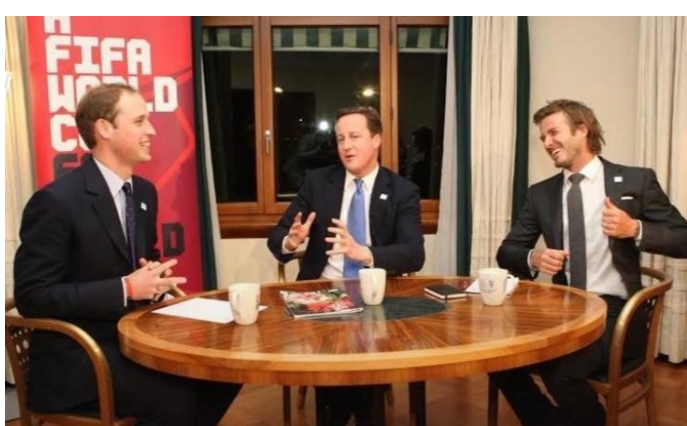It is coming up to 14 years since FIFA’s Executive Committee decided that Russia, rather than England, should host the 2018 FIFA World Cup.
Much has been written about the Bid. The corruption at FIFA that accompanied it has been endlessly and articulately analysed. Many have delved into why England did not win, and what that tells us for future bids.
But I want to focus on my biggest regret of our not winning the Bid- and that is the lost economic benefit to the country that would have flowed. Put simply, I believe that, had England won the World Cup Bid, the UK would immediately have come out of recession in December 2010 and the economic and social story of this country would have been entirely different.
In December 2010, The UK was in a recession. Austerity was biting and the economic climate was gloomy. Had we won the World Cup Bid, the boost to the economy would have been immediate and significant, and would have transformed our economic landscape.
There were the host cities and regions that would have benefitted. I reflect at times of how much Sunderland missed out on as a result of our Bid failing . There was no question that the Stadium of Light would have been one of the stadiums – it was a cornerstone of our Bid and the FIFA Inspection tour.
The civic pride that Sunderland had showed at being included in the Bid was a point of light for the city in 2010. Had Sunderland been a Host City, there would have been huge inward investment, city improvements, a widening of tourism and improved transport and social infrastructure. We promised, with full agreement from Government and the Local Authorities, that the Tyne and Wear Metro would have been modernised. Winning the Bid would, at a stroke, have transformed national perceptions of Sunderland and the opportunities for the entire Tyne and Wear Region.
As for Sunderland, so too for Bristol, Milton Keynes, Sheffield and Plymouth, the cities that had not been widely expected to be in the Bid. The outbreak of civic and communal joy when these Cities were included in the Bid were a foretaste of the optimism and creativity that a successful Bid would have unleashed.
There would have been huge investment in infrastructure and construction, creating jobs and stimulating economic growth all the way across the country. With the Host Cities also including Liverpool, Manchester, Leeds, Nottingham and Birmingham, the North and Midlands would have benefited disproportionately from this investment. This might have rendered the current Government policy to “level up” the economy to be redundant. The economy would have already been balanced as a result of this investment. The North, far from being left behind, would have been at the heart of capital investment.
Many transport enhancements were planned between the Bid and the Tournament. With full agreement from the Department for Transport, our Bid Book listed at least 8 major National planned projects and improvements. We committed to investment and support for the Railways totalling £35BN between 2009 and 2014. There were station improvements in Reading, Birmingham, and Kings Cross. Crossrail would have been finished. The planned Northern Hub project would have gone ahead. This was expected to deliver faster journeys between Liverpool, Manchester, Sheffield, Newcastle and Nottingham. Key lines, including the Great Western Line would have been electrified, as would the Midland Main Line from St Pancras to Sheffield..
Once we lost the Bid, many of these projects were delayed, slowed down or shelved completely. The Northern Hub, for example, was indefinitely put on hold. Think how different the political debate about “Northern Powerhouse” and “Levelling up” would have been had the Bd been successful and these improvements gone ahead.
There would have been a substantial enhancement of the country’s hotel stock. At the time of the Bid, England had 396,000 hotel rooms. Our Bid promised a further 20,500 rooms already scheduled and there would have been further development in and round each of the Host Cities. This would have created not just construction jobs, but long term Leisure industry jobs, focussed especially on female workers, part time and flexible workers and 16-25 year old workers – those that traditionally make up a large part of the Leisure and hospitality workforce.
The 12 Stadiums would have been developed for the Tournament with many being expanded and redeveloped. The new Tottenham stadium would have received a financial boost and might have opened up to three years earlier than it did. There would have been new stadiums in Liverpool, Nottingham, Bristol and Plymouth.
England would have become more quickly a centre for inward business travel. The Sports conference market tends to focus on the next host country for the 4 years leading up to the Tournament, and so the business and conference market missed out on the boost that hosting would have provided.
So, had the England Bid been successful, we would have come out of recession more quickly, ended austerity, balanced the economy between regions and created thousands of new and sustainable, flexible jobs.
Is all this sour grapes on my part? No. This 10 year anniversary has caused me to reflect on how different our country could have been. With the benefit of massive hindsight, it allows us to see what we missed out on by not being successful.
So, is this all doom and gloom? Not really. Our country came out of recession eventually and many of the transport and other infrastructure investments happened in the end – with the exception of Crossrail, which is still not complete and the Northern Hub, which may never complete.
I, of course, have a major tournament in England to look forward to in 2021. The Rugby League World Cup 2021 will take place in Leeds, Liverpool, Newcastle, St Helens, Hull, Leigh, Bolton, York, Huddersfield, Doncaster and Middlesbrough. In the North of England. It will be the most diverse tournament there has ever been in any sport. This gives the whole country and the entire sport and leisure community a tournament to look forward to, which will lift the gloom, provide light after the end of the Covid restrictions and balance up the Northern economy.
So, let’s all look forward to the Rugby League World Cup 2021.




